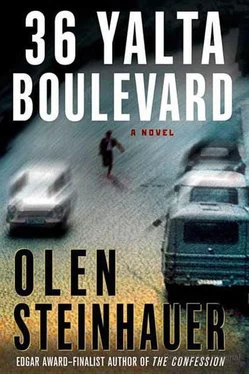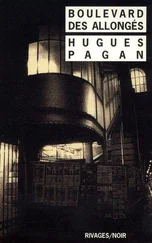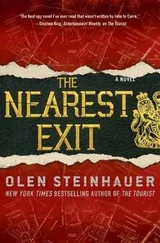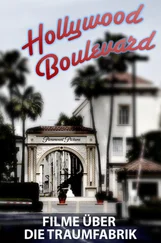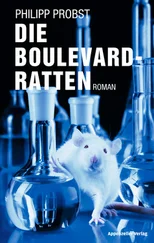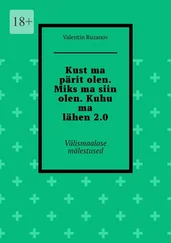Olen Steinhauer - 36 Yalta Boulevard
Здесь есть возможность читать онлайн «Olen Steinhauer - 36 Yalta Boulevard» весь текст электронной книги совершенно бесплатно (целиком полную версию без сокращений). В некоторых случаях можно слушать аудио, скачать через торрент в формате fb2 и присутствует краткое содержание. Жанр: Политический детектив, на английском языке. Описание произведения, (предисловие) а так же отзывы посетителей доступны на портале библиотеки ЛибКат.
- Название:36 Yalta Boulevard
- Автор:
- Жанр:
- Год:неизвестен
- ISBN:нет данных
- Рейтинг книги:3 / 5. Голосов: 1
-
Избранное:Добавить в избранное
- Отзывы:
-
Ваша оценка:
- 60
- 1
- 2
- 3
- 4
- 5
36 Yalta Boulevard: краткое содержание, описание и аннотация
Предлагаем к чтению аннотацию, описание, краткое содержание или предисловие (зависит от того, что написал сам автор книги «36 Yalta Boulevard»). Если вы не нашли необходимую информацию о книге — напишите в комментариях, мы постараемся отыскать её.
36 Yalta Boulevard — читать онлайн бесплатно полную книгу (весь текст) целиком
Ниже представлен текст книги, разбитый по страницам. Система сохранения места последней прочитанной страницы, позволяет с удобством читать онлайн бесплатно книгу «36 Yalta Boulevard», без необходимости каждый раз заново искать на чём Вы остановились. Поставьте закладку, и сможете в любой момент перейти на страницу, на которой закончили чтение.
Интервал:
Закладка:
Klara brought a large dish of pork cabbage rolls, and Lucjan ducked his head as he followed her in with his vodka, sealed in a used liter-sized soda bottle. Lucjan was nearly two heads taller than Brano, ruddy in the face, his wide shoulders stretching the back of his shirt, but his handshake had almost no strength at all. Mother took the vodka from him and disappeared with Klara into the kitchen.
Lucjan tried to smile. “Klara says you’re on vacation.”
“That’s true.”
“You don’t know how long?”
“A week, probably. Just long enough to get some rest.”
“Must be nice, having that kind of relationship with your manager. He doesn’t care?”
“He’s a good friend.”
“Known him a long time?”
“Are you always so curious?”
Lucjan let out a nervous laugh, then settled on the sofa and began to roll a cigarette, his big fingers fumbling with the thin paper. Brano watched. “She told me you’re doing well at the cooperative.”
“Klara’s an optimist.”
“But you’re doing administrative work. That’s a good sign.”
He licked the paper and sealed the cigarette. “What about you? You’re not used to working a factory job, are you?”
“Not so different. There are orders, and I follow them. 1 do all right.”
“That’s the answer I’d give, too.” He offered the damp cigarette, but Brano shook his head.
Klara had known Lucjan Witaszewski all her life, and perhaps this explained the unimpressive choice she’d made at the age of seventeen. Brano had been working in the Capital for four years when the wedding invitation arrived in his mailbox. But that was 1948, and in the Capital there had been no end to the work. In almost every alley hid another criminal, the detritus all wars produce, and on top of that, there had been a new man in the Militia office named Emil Brod who had to be followed and examined and, finally, accepted.
So he had mailed his response the next day: He could not come, but he wished them every happiness in their new, shared life, and had every hope that unity like theirs would be the backbone of their new, great society.
Klara had never replied.
Now, nearly two decades later, she placed two glasses of vodka on the coffee table and ran her fingers through her husband’s hair. “What’s the subject?”
“Work,” said Lucjan.
“Just as long as it’s not politics. Now drink.”
Both men did as they were told, and Brano admitted that Lucjan’s apricot vodka was rather good. Lucjan shrugged his thanks.
They went to the kitchen table while Mother dished everything out. “No ceremonies here,” she said. “Just eat.” Brano followed the order, but Klara bowed her head-a quick prayer-before lifting her fork.
Conversation lingered on work as Lucjan revealed an unexpected excitement, describing the new drilling rig that had been delivered. “The Austrians know what they’re doing, I can tell you that. They sent over the Trauzl-a cable rotary rig on wheels. A real beauty!”
Brano noted that the factories in Uzhorod were pumping out record numbers of tractors and industrial machines. Klara wasn’t impressed. “These production records don’t do anything for Bobrka. You can see it yourself. Now that it’s winter, we’re hibernating, like always. Go out after dark, and Bobrka’s a ghost town. I suppose the Capital never gets like that.”
“It doesn’t,” said Brano.
“Makes you wonder what goes on behind the windows,” Klara said. “They’re still living their lives.”
“They’re eating their mothers’ meals,” said Mother.
“And having more sex.”
“ Lucjan,” said Klara.
Lucjan shook his head. “What they’re doing is playing cards. That’s what.”
Mother frowned.
“There’s a lot of gambling?” asked Brano.
Lucjan’s face shriveled. Klara looked up.
Brano opened his hands and gave a smile so small that it could be seen by no one. “I’m not going to arrest anyone for it. That’s not what I do.”
Lucjan shrugged. “Everyone does it, right?”
“I do it myself,” he lied.
“But not like here, I hope,” said Mother.
“Like here?”
Lucjan looked at his plate. “It’s like in a lot of villages. These peasants run out of money, and the bets get a little strange. You know. I’ll bet my horse on this hand. That sort of thing.”
“Not so strange,” said Brano. “The same as betting your watch.”
“But what about your child?” Klara asked.
Occasionally, Brano had heard of this sort of thing during his years in the Militia office in the Capital, though it happened more often in the countryside: men betting the life of a daughter, a wife, a mother. It was a repulsive element of the old world that socialism had not yet wiped clean. But he pretended it was news. “Child?”
Klara went back to her plate, her face as red as the Comrade Lieutenant General’s, but not from drink.
“Some guy,” said Lucjan. “An idiot. He was drunk, and he bet his little girl’s life on a hand of cards. Can you believe it?”
“So what happened?”
Lucjan smiled. “He won! Thank God.”
The silence that followed felt long, and they each looked at him: first Lucjan, before facing his plate again, then Mother, who gave a fragile smile. Finally, Klara’s stoic gaze held him for a long time before returning to her food. It was a look Brano could not quite decipher, but it gave him a sudden, overwhelming feeling that he was far from home and among strangers.
After dinner they returned to the living room and worked slowly on the vodka, Mother filling the silences with gossip Brano had already heard the night before. His sister and her husband had probably heard it all as well, for they only grunted into their glasses as she chronicled the love affairs of the town.
Then, with enough liquor warming him, Brano said, “A while ago, I took a trip to Vienna.”
“Vienna?” said Mother. “I didn’t know you went there.”
“I did, for a little while. Work. A friend of mine was having a party. There was some food, but it was gone quickly, and everyone began drinking heavily. I ran into the woman he was dating-she read tarot cards for a living.”
Lucjan snorted. “Tarot cards?”
“She was very nice to me. She had been drinking quite a bit. Someone was playing an acoustic guitar and leading the room in song.”
“You sang? ” said Klara.
“No.” Brano set his glass on the table. “After a while, this woman asked me to dance.”
“Did you dance?” asked Mother, looking around. “Have you ever seen Brani dance?”
“Never,” said Klara.
“I did dance, but not at first,” said Brano. “She continued to stand very close, watching me. So I asked her where my friend was. She said she had told him to go to hell. She’d told him he was a bore and she never wanted to speak to him again.”
Lucjan leaned forward. “She told him that?”
“Well, if he was boring-” began Klara.
“There’s a difference between the truth and civility.”
Klara shrugged at Mother, who smiled back.
“It was none of my business,” said Brano. “But I tried to defend him to her. She would have none of it. Finally, she grabbed my arms and pulled me close to her and said, Brano Sev, I love you’ ”
“She didn’t,” said Mother.
Klara grinned. “This is fantastic!”
Brano shook his head. “I told her she was mistaken. We’d only met once before, and she didn’t know who I was at all. She couldn’t be in love with me. It was impossible.”
“Nuts, that one,” said Lucjan.
“We danced a little, and by then it was very late. Most everyone had left. I wanted to get out of there, but she was clutching on to me. So I told her I’d walk her home. She was drunk, and it seemed like the gentlemanly thing to do.”
Читать дальшеИнтервал:
Закладка:
Похожие книги на «36 Yalta Boulevard»
Представляем Вашему вниманию похожие книги на «36 Yalta Boulevard» списком для выбора. Мы отобрали схожую по названию и смыслу литературу в надежде предоставить читателям больше вариантов отыскать новые, интересные, ещё непрочитанные произведения.
Обсуждение, отзывы о книге «36 Yalta Boulevard» и просто собственные мнения читателей. Оставьте ваши комментарии, напишите, что Вы думаете о произведении, его смысле или главных героях. Укажите что конкретно понравилось, а что нет, и почему Вы так считаете.
